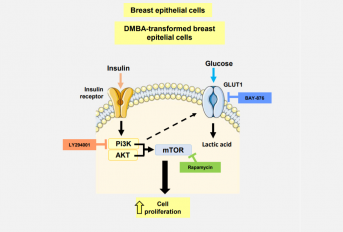Associação Portuguesa de Investigação em Cancro
High insulin levels contribute to the initiation of breast cancer
High insulin levels contribute to the initiation of breast cancer

Type 2 diabetes mellitus (T2DM) and breast cancer are diagnosed in the same individual more frequently than would be expected. The metabolic alterations that occur in T2DM can probably explain this link. However, to date, the studies done have not been sufficient to identify the mechanisms underlying the link between T2DM and breast cancer. It is therefore critical to identify new molecular targets that link T2DM and breast cancer and to develop new therapeutic approaches that prevent and control breast cancer initiation, promotion and progression in patients with T2DM.
In view of the above, the group lead by Fátima Martel, of the Faculty of Medicine of Porto, sought to understand how some of the characteristics associated with DM2 (hyperglycemia, hyperinsulinemia, hyperleptinemia, low-grade chronic inflammation and increased levels of oxidative stress) influence the initiation of breast carcinogenesis. In order to mimic the initiation of breast carcinogenesis, the authors exposed a breast epithelial cell line to an inducer of carcinogenesis (DMBA) and showed that high levels of insulin, an important feature of T2DM, promotes cell proliferation, which is dependent on an increase in cellular uptake of glucose mediated by the glucose transporter GLUT1, and is mediated by activation of the PI3K and mTOR intracellular signaling pathways.
These results suggest that inhibition of these mechanisms may, therefore, be an effective approach to preventing breast cancer initiation in T2DM patients.
Authors and Affiliations:
Cláudia Silva1,2, Nelson Andrade1,2,3, João Tiago Guimarães1,4,5, Emília Cardoso2, Catarina Meireles2, Vanessa Pinto1,6, Joana Paiva1,6,7 and Fátima Martel1,2
1 Unit of Biochemistry, Department of Biomedicine, Faculty of Medicine, University of Porto, Porto, Portugal
2 Instituto de Investigação e Inovação em Saúde (i3S), University of Porto, Porto, Portugal
3 REQUIMTE/LAQV, Department of Chemical Sciences, Faculty of Pharmacy, University of Porto, Portugal
4 Department of Clinical Pathology, São João Hospital Centre, Porto, Portugal
5 Institute of Public Health, University of Porto, Porto, Portugal
6 iLoF, Intelligent Lab on Fiber, Limited, United Kingdom
7 Instituto de Ciências Biomédicas Abel Salazar, University of Porto, Porto, Portugal
Abstract:
Type 2 diabetes mellitus (T2DM) is linked to an increased risk of breast cancer. We aimed to investigate how T2DM-associated characteristics (high levels of glucose, insulin, leptin, inflammatory mediators and oxidative stress) influence breast cancer carcinogenesis, in DMBA-treated (MCF-12ADMBA) and non-treated breast epithelial (MCF-12A) cell lines. Insulin (50 nM) promotes cell proliferation, 3H-DG uptake and lactic acid production in both cell lines. The stimulatory effects of insulin upon cell proliferation and 3H-DG uptake were hampered by rapamycin, LY294001, and BAY-876, in both cell lines. In conclusion, hyperinsulinemia, one important characteristic of T2DM, contributes to the initiation of breast cancer by a PI3K- and mTOR-dependent mechanism involving increased GLUT1-mediated glucose uptake.
Journal: Cell Biochemistry & Function
Link: https://pubmed.ncbi.nlm.nih.gov/35014047/




